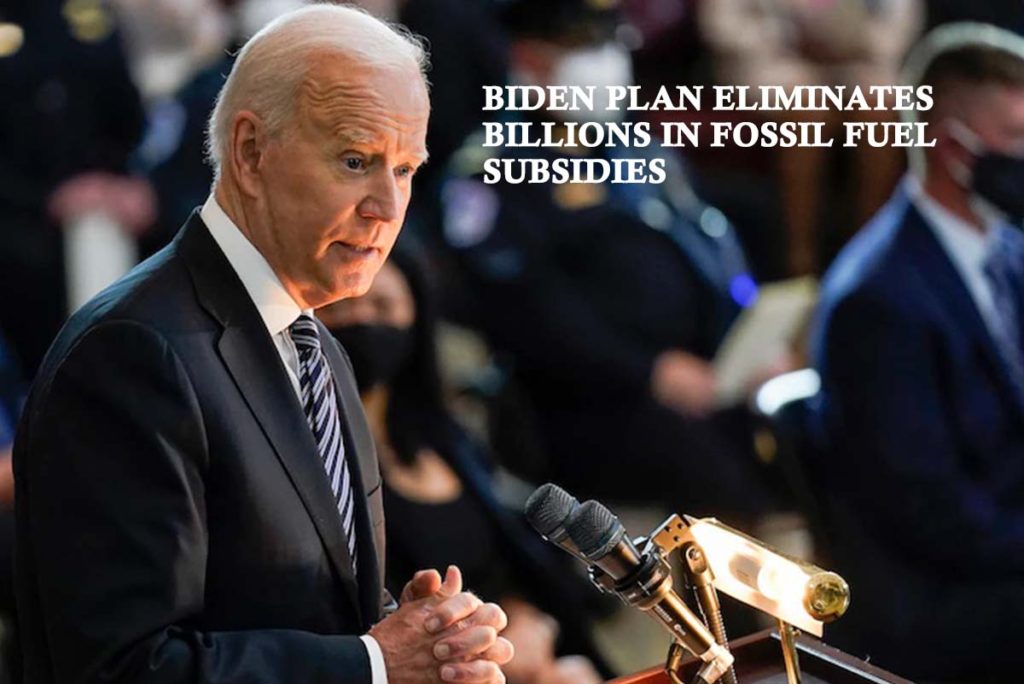Among the 2021 plans, Biden Plan Eliminates Billions In Fossil Fuel Subsidies. President Joe Biden has unveiled a $2 trillion infrastructure plan that promises to overhaul the nation’s highways, airports, electrical grid, and more.

This will be partly paid for by repealing subsidies for the fuel industry. Currently, the U.S. gives the $180 billion fuel industry between $5 billion to $62 billion each year in direct subsidies, based on the estimate.
When accounting for indirect subsidies, including public health impacts/global climate change, the handout might be high as $649 billion.
Biden Plan Eliminates Billions In Fossil Fuel Subsidies
The Biden administration hasn’t specified which tax credits or subsidies it might eliminate. And certain subsidies probably are going to be subject to horse-trading in Congress.
This makes it difficult to achieve an accurate number at this time. But the amount would definitely be within the range of billions of dollars.
If the Biden administration is successful, the US would be following through on a promise made at the 2009 G20 summit.
And it stated that signatories should “phase out and rationalize over the medium-term inefficient fuel subsidies.”
Handouts given to the fuel industry run the gamut. Oil companies, for instance, can take a tax reduction for a majority of their costs for drilling domestic wells.
They also get to use special accounting methods that reduce their tax burden for both domestic and foreign sales. Oil producers also are considered manufacturers under certain parts of the tax code. And this allows them to claim a tax deduction intended to stop the outsourcing of jobs.
Coal companies similarly enjoy “clean coal” projects and accounting methods that increase the quantity of depreciation they will claim when mining a reserve.
Though the end of subsidies would be a big change in policy. Most of Biden’s plan would be acquired by raising the company tax from 21 percent to 28 percent.
Biden’s Big Plans
Biden’s proposal includes the standard planned investments in roads and bridges. But it also involves $85 billion to revamp existing mass transit systems, which are in desperate straits across the US as ridership has plummeted during the pandemic.
Amtrak would receive $80 billion to handle its backlog of repairs. And also, the plan will direct an unspecified amount of cash to impress the US mail service fleet. As well as a minimum of 20 percent of the nation’s school buses.
Benefits
Infrastructure supporting electric vehicles would also get a lift under the plan. Biden is repeating his demand for 500,000 EV chargers by 2030.
The network would presumably be public, helping to deal with one of the main criticisms of an all-electric vehicle fleet.
Many renters don’t have access to charging stations when their car is parked at home. And lots of owners of single-family homes might not have the funds to install one.
A public network, especially one that has tens of thousands of fast chargers, would go a long way toward addressing this issue.
If the 500,000 chargers are installed at a continuing rate, the network would comfortably exceed demand. As estimated in a 2019 report from the International Council on Clean Transportation. And it suggested that the US would want just over 100,000 public chargers in 100 major metro areas.
In order to support the EV charger network, Biden’s plan proposes 20 gigawatts of high-voltage power lines and a ten-year extension is a neat energy tax credit. Including a provision for energy storage.
It also involves domestic supply chains to support battery manufacturing. Currently, the US lags behind Europe and Asia in this sector. Production at Tesla, for instance, has been constrained by limited supplies.
The supply supporting a domestic supply chain, including raw and intermediate battery materials, would be key to giving the arena a leg up.
Previous efforts to make an electric battery manufacturing industry within the US failed partially based on a nonexistent domestic supply chain.
Conclusion
Biden’s plan is, of course, a proposal at this time. The administration will need to work with Congress. And also, the plan’s passage may require the use of the 51-vote budget reconciliation process. Since Republicans are unlikely to support it in meaningful numbers.
More Related Content
- Stylish 13.5″ and 15″ Windows PCs get Extra Power in the Surface Laptop 4
- Leaked Microsoft Surface Laptop 4 Pricing Details – Microsoft Surface Laptop 4
- Facebook Stock Price – How Can I Buy Stock In Facebook
- Canva for Teachers – Ways to Use Canva in Your Classroom
- Facebook 2021 Updates – Latest Updates on Facebook in 2021



